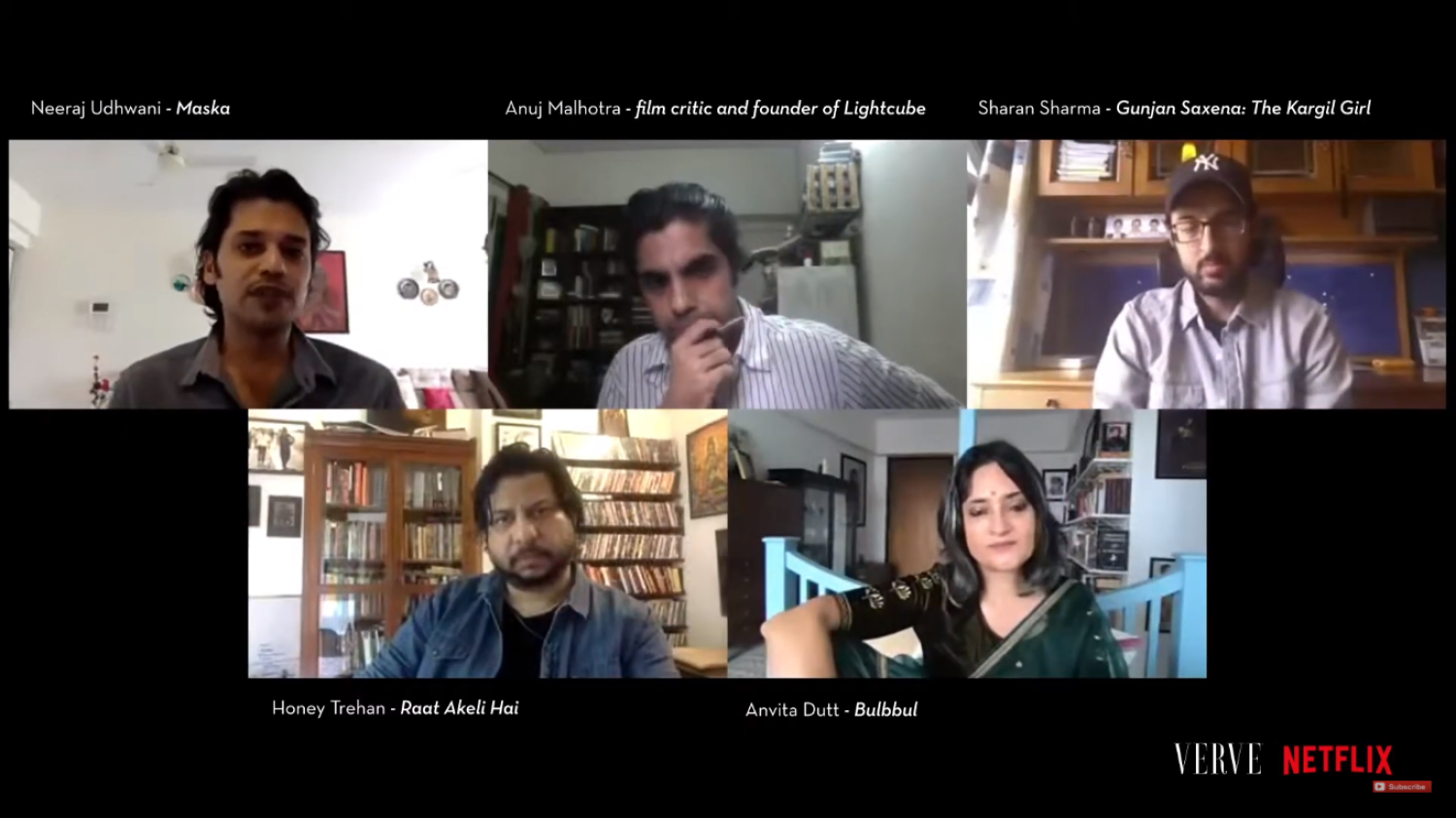A recent virtual conversation involving the filmmakers, moderated by Anuj Malhotra, discussed whether a film’s eventual destination, the big screen or a digital platform, affects its making.
OTT or theatres? Filmmakers Anvita Dutt, Neeraj Udhwani, Honey Trehan, Sharan Sharma discuss
Mumbai - 14 Sep 2020 22:05 IST
Updated : 15 Sep 2020 9:12 IST


Our Correspondent
Last month, filmmakers Anvita Dutt, Neeraj Udhwani, Honey Trehan and Sharan Sharma, all of whose debut films were released on Netflix, spoke with Anuj Malhotra, founder of Lightcube, about their processes and filmmaking journey in an online talk titled Are You Still Watching? Hindi Cinema and Storytelling in the Netflix Era.
Since filmmakers are now aware beforehand whether their films will head to theatres or the small screens at home or office, Malhotra asked if their filmmaking grammar or writing was influenced in any way by this knowledge.
Two of the filmmakers, Dutt and Udhwani, knew that their films, Bulbbul (2020) and Maska (2020), respectively, were heading for a digital release, while Trehan and Sharma’s films, Raat Akeli Hai (2020) and Gunjan Saxena: The Kargil Girl (2020), respectively, were originally supposed to be released in theatres before the COVID-19 pandemic struck, changing everything.
“If you read the script of Bulbbul, [you] will see [exactly] what you are seeing on screen, in terms of the language and shot taking. You would get a sense of it even when you are reading the script. Regardless of the medium this is exactly how I would have made it because I’m serving the story [and] script,” Dutt said.
The writer-turned-director added that when Netflix came on board, she didn’t stop herself from envisioning her film the way she wanted to. “I took the shots the story wanted," she said, "the way the story wanted to be told regardless of canvas.”
Sharan Sharma agreed. “I don’t think filmmaking creative choices are the reflection of external things, like platforms, what people are going to think, etc,” he said. “For me, it’s staying true to the story and the storytelling, it’s what dictated every choice through the making of the film.”
He said that just because more people might be watching the film on phones, he did not believe that one would need to add more close-ups, for instance. "If a story is a good story, it should work on a big screen, on IMAX, on a phone, iPad, whatever, it should do the job,” he said.
Honey Trehan, who has been casting director on several award-winning films, said there is a certain discipline to seeing a film in a theatre. “We are more respectful of the craft," he pointed out. "Maybe we will adapt that thing on OTT also because in OTT you have that control in your hand.”
Trehan said if he had known that Raat Akeli Hai would be released directly on Netflix, he would have made a few changes in the film. “When the song ‘Ghoom Charkheya' comes in the second half, I designed the song so that when you watch the film in the theatre, it will go well,” he explained. “But when you are watching it on OTT or on a computer screen, that’s my opinion, I would have treated it in a shorter manner and probably on the background score, to make it more engaging, because when you are watching a film [on an OTT platform], the remote is in your hand, you can pause, stop, walk out, walk in, and get into the film again.”
Udhwani brought up another woe that most filmmakers of smaller movies face when they are released in theatres. He believes these films get a better response on OTT platforms.
“When you choose to release your film in the theatres, you are at the mercy of the exhibitors to give you the shows," he said, "and then they will also see what the star cast is, and they will give you a 9am show and nobody will be able to watch your film and you will be heartbroken. So you might as well choose a platform that does justice to your film.
“On Netflix, you are not dependent on someone to give you [a timing], it’s going to be forever there on the platform, anybody who is interested can go watch it,” he continued, saying he had learnt from other filmmakers’ struggles.
Dutt, meanwhile, was happy that Bulbbul was released in 190 countries around the world thanks to Netflix. That’s a lot more exposure than what she would have got had the film been released in 200 theatres.
Sharma, however, pointed to the unique experience that only a theatre offers. “The part which can never be replicated is the collective experience of watching a film in a group [which] can also impact your emotional experience of watching a film, which is not the same sitting at home and watching it {alone]. Personally, for me, that’s never been a problem, but I know for other people, a lot of responses I’ve got on this film is we really enjoyed it, but we would have enjoyed watching it with people,” he said.
Netflix is currently streaming Maska, Bulbbul, Raat Akeli Hai and Gunjan Saxena: The Kargil Girl. Watch the conversation between the filmmakers below.
Related topics
Netflix








